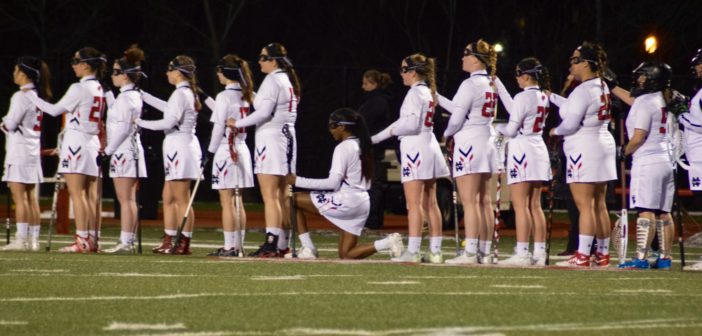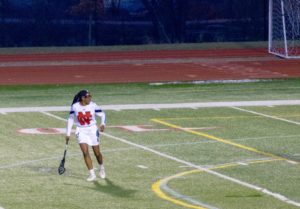Standing on the field in Benedetti-Wehrli Stadium among her teammates and coaches minutes before the first draw of the 2018 women’s lacrosse season, Mynk Richardson-Clerk (’20) dropped to a knee as the opening notes of “The Star-Spangled Banner” reverberated around the stadium.
It’s an act that’s drawn harsh condemnation from President Donald Trump, cost a company a multimillion-dollar deal, not to mention becoming synonymous with an unsigned quarterback. Now, it’s arrived at North Central.
The protest was motivated by several issues Richardson-Clerk felt needed to be addressed. “Obviously it’s for the initial reason that Colin Kaepernick knelt, which is for police brutality and all the African Americans who have been shot and didn’t get any justice,” Richardson-Clerk said.
“But it’s also more than that. It’s the mass incarceration, it’s the environmental racism, it’s the microaggressions,” she said.
Richardson-Clerk is no stranger to microaggressions, even on North Central’s campus. She said that during fall term, someone referred to her as Lil Wayne because of her hair. Recently, she was watching film of a lacrosse scrimmage and could hear whispers of “it’s cause she’s black” by the students filming in response to a play she made on the field.
Richardson-Clerk said she fully understands that her protests have the potential to rub a lot of people — including some of her teammates — the wrong way because people look past the message and focus on the action.
“They automatically think ‘oh, it’s about the veterans’ and it really isn’t. There have been veterans that have said ‘it’s OK, we fight for your right to be able to protest,” she said, before explaining how Kaepernick transformed his protests from sitting to taking a knee after talking with a veteran about a more respectful way to protest.
“So the movement itself is not disrespectful, but people have associated it with veterans as a way to discredit it and then sidetrack the conversation,” she added.
Consequently, Richardson-Clerk says she was frustrated, but not surprised when her teammates told her they were hurt by her actions. “I’m the only black girl on the on the lacrosse team. There’s really no one else on my side that gets it or understands it,” she said. “I go to a predominantly white school so I’ve heard that opinion before, but I feel like a lot of people on the other side haven’t necessarily heard my side or the side of people of color because they don’t have to, they haven’t been around it.”
As for this counter-argument, Richardson-Clerk pointed out the problematic nature of “The Star-Spangled Banner”: “It’s just so hypocritical because the man that wrote our national anthem was an anti-abolitionist. We have these lyrics that talk about ‘land of the free and home of the brave’ but it’s not. America was founded on racism and oppression and people just don’t get that. They’re blinded by this toxic patriotism and nationalism. Why do we value a flag and a song so much, but not the people that make up the flag, not the people that are dying on the streets (who) are not finding justice?”
At the Feb. 28 lacrosse match, Richardson-Clerk found more supporters than dissenters in the stadium as Chaplain Eric Doolittle and members of the Black Student Association, Mosaic, Focus and OUTreach knelt in solidarity in the stands.
Looking forward, Richardson-Clerk says she plans on continuing her protests for the duration of the season. “I plan on doing it at every single game, whether it be home or away,” she said.
*Editor’s note: This story has been updated to correct the spelling of Mynk Richardson-Clerk’s name.


